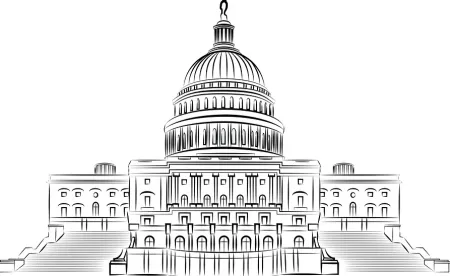House Panel Discusses Border Security; Court of Appeals Upholds Stay Against Trump Travel Ban; Administration Considering Other Options
Legislative Activity
Lawmakers Unveil Report, Legislation to Strengthen U.S. Aviation Security
On Monday, February 6, the majority staff of the House Homeland Security Committee released a report titled “America’s Airports: The Threat From Within.” The report recommends nine ways to assist airports, airlines, and the Transportation Security Administration (TSA) to address insider threats facing the U.S. aviation sector. The report is the result of a two-year oversight investigation conducted by Transportation and Protective Security Subcommittee Chairman John Katko (R-NY), who introduced the Aviation Employee Screening and Security Enhancement Act of 2017 (H.R. 876) in tandem with the report’s release. Rep. Katko stated that H.R. 876 and the report’s recommendations will “serve as a roadmap for TSA, airports, and air carriers to close security vulnerabilities at our nation’s airports.”
The report cites inadequate airport access controls, or safeguards to protect and restrict access to high risk areas, as an area of serious vulnerability in aviation security. The report identifies inconsistencies in airport and air carrier employee vetting and education, which the panel argues inhibits the securing of sensitive areas, and calls for a reexamination of credentialing processes to enhance access control security. The report states that credentialed airport officials across the country “may not understand the potential risk inherent in weak access controls” and that government partners are not sufficiently supportive of industry efforts to mitigate insider threats to aviation systems.
The report recommends that air carriers, airports, and the TSA:
-
Take steps to adequately educate aviation workers on their role in mitigating insider threats and securing access to sensitive areas in airports;
-
Reassess credentialing practices to ensure individuals with access to sensitive areas are held to stringent standards and are regularly subjected to risk assessments;
-
Consider expanding the physical screening of employees;
-
Identify advanced technologies for securing employee access and reduce the number of employee access points at airports;
-
Improve the relationship between TSA and industry stakeholders at certain identified airports;
-
Increase the covert testing of Playbook, an airport security program, operations at U.S. airports to measure security readiness and effectiveness; and
-
Strategically target the use of TSA employee screening operations.
The report also argues that local airports must have the flexibility to implement robust security standards, but the increasing threat environment requires a “comprehensive assessment of America’s airport security posture.” The report identifies drug and firearm smuggling as major insider threats and cites several security breaches carried out by TSA employees, including recent incidents in Dallas, Los Angeles, San Francisco, and Puerto Rico that were successfully thwarted by TSA insider threat mitigation efforts.
Homeland Security Committee Unveils February Terror Threat Snapshot
House Homeland Security Committee Chairman Michael McCaul (R-TX) released a monthly assessment of the global terror environment this week, February’s Terror Threat Snapshot.
The assessment details recent efforts by the Islamic State of Iraq and Syria (ISIS) to commit homegrown acts of terror on the United States, as well as U.S. progress in combating, identifying, and thwarting such efforts. It also discusses security threats from Al-Qaeda, the Taliban, and Iranian ballistic missile testing.
The snapshot cites at least 166 ISIS-linked plots or attacks against Western targets since 2014, including 36 in the U.S., 69 in Europe, and 61 targeting westerners outside of the U.S. or Europe. The snapshot also cites a total of 193 homegrown “jihadist” cases in the U.S. since 9/11, the majority of which have reportedly taken place in the last few years. The report notes an “alarming” forecast for the threat environment in 2017 characterized by increasing incidents of homegrown terrorism.
House Panel Discusses Border Security
On February 7, 2017, the House Homeland Security Committee held a hearing, “Ending the Crisis: America’s Borders and the Path to Security,” where lawmakers heard testimony from Department of Homeland Security (DHS) Secretary John Kelly and a panel of law enforcement officials from border communities about securing the southwest border, enforcing immigration law, and President Trump’s executive order suspending the admission of immigrant and nonimmigrant visa holders from select countries.
During the hearing, several lawmakers, including Ranking Member Bennie Thompson (D-MS) and Rep. Bonnie Watson Coleman (D-NJ), Cedric Richmond (D-LA), and Donald Payne (D-NJ), questioned the Executive Order. In response, Secretary Kelly emphasized that the order was not a “Muslim ban,” but rather a temporary pause to evaluate and strengthen the current vetting processes. He also noted that certain countries, such as Saudi Arabia, were excluded from the ban based on the reliability of their police and intelligence records. Secretary Kelly explained that in other countries, citing Syria as an example, the absence of accurate records prevents thorough vetting of individuals seeking admission to the United States. Other Committee members applauded the Executive Order as a step in the right direction. Chairman McCaul voiced his support for enhanced vetting and argued that the ban was about risk, not religion. However, Chairman McCaul did note that the roll-out of the order could have been smoother. Secretary Kelly acknowledged that there were some hiccups when the order was first carried out, but stated DHS quickly made the necessary adjustments. He also expressed his desire to coordinate more closely with Congress on immigration issues and the vetting process going forward.
This Week’s Hearings:
-
On Tuesday, February 14, the House Armed Services Committee has scheduled a hearing titled “The Evolving Threat of Terrorism and Effective Counterterrorism Strategies.” The witnesses will be:
-
Professor Bruce Hoffman, Director, Center for Security Studies, Georgetown University;
-
Brian Michael Jenkins, Senior Advisor to the President of RAND Corporation; and
-
Ambassador Michael Sheehan, Distinguished Chair, Combating Terrorism Center at West Point.
-
-
On Tuesday, February 14, the Senate Armed Services Committee has scheduled a hearing titled “Long-term Defense Challenges and Strategies.” The witnesses will be:
-
Honorable Robert O. Work, Deputy Secretary of Defense; and
-
James H. Baker, Director, Office of New Assessment, Office of The Secretary of Defense.
-
-
On Tuesday, February 14, the House Homeland Security Subcommittee on Emergency Preparedness, Response, and Communications has scheduled a hearing titled “The Future of FEMA: Stakeholder Recommendations for the Next Administrator.” The witnesses will be announced.
-
On Thursday, February 16, the House Homeland Security Subcommittee on Border and Maritime Security has scheduled a hearing titled “A Dangerous and Sophisticated Adversary: The Threat to the Homeland Posed by Cartel Operations.” The witnesses will be announced.
-
On Thursday, February 16, the House Homeland Security Subcommittee on Oversight and Management Efficiency has scheduled a hearing titled “Watchdog Recommendations: A Better Way Ahead to Manage the Department of Homeland Security.” The witnesses will be announced.
Executive Branch Activity
Court of Appeals Upholds Stay Against Trump Travel Ban; Administration Considering Other Options
On Thursday, February 9, the U.S. Court of Appeals for the Ninth Circuit ruled against the Trump Administration and upheld a Federal District Court ruling that blocked implementation of an Executive Order that would limit travel to the United States by certain visa holders and admissions under the U.S. Refugee Admissions Program (USRAP). Travelers from the seven impacted countries and refugees may continue to enter the United States as the case proceeds.
In media appearances on Sunday, February 12, White House advisor Stephen Miller confirmed that the Trump Administration is currently considering actions to advance the President’s travel ban. In an interview with Fox News Sunday, Miller said these options include “seeking an emergency stay at the Supreme Court, continuing the appeal with the panel, having an emergency hearing en banc, or going to the trial court at the district level and trial on the merit,” as well as potential “new executive actions designed to prevent terrorist infiltration of our country.” He argued that the President has broad authority under the constitution to “engage in conducting border control and immigration control of this country.”






 />i
/>i

